Karamo Brown: Call Me By Your Name is ‘predatory’

Karamo Brown spoke to followers in August about his attempted suicide (Vivien Killilea/Getty)
Queer Eye‘s culture expert Karamo Brown has criticised the 2017 film Call Me By Your Name, saying it is “predatory” and “problematic.”
The Queer Eye star told Insider that he took issue with the film, based on André Aciman’s book of the same name, because of the relationship between 17-year-old Elio and 24-year-old graduate student Oliver.
“I know we’re calling him a college student, but it looks like a grown man having sex with a little boy.”
— Karamo Brown
“I’ve worked with many survivors of sexual assault, especially in the LGBTQ community, which oftentimes goes unreported. And so the minute I saw that movie, I thought, ‘Here we are glorifying this sort of relationship,'” he said.
Karamo Brown: There is “predatory” behaviour on Call Me By Your Name
“I know we’re calling him a college student, but it looks like a grown man having sex with a little boy. And for me, I just was not OK with that. And I was like, ‘Why are we pretending like this is OK in any sense? Fashion or form?'”

Karamo Brown tweeted that he stands by what he said. (Karamo/Twitter)
The movie, directed by Luca Guadagnino, features Timothée Chalamet as Elio and Armie Hammer as Oliver, who were 20 and 30 years old respectively when it was filmed.
Brown said there was “predatory behaviour” in the movie, which he added portrayed Armie Hammer’s character as looking “dramatically older than this young man.”
“I stick by what I said,” says Karamo Brown
He continued: “I think to myself, ‘If that was an older man, or a perceived college student who looked that much older with a 16 or 17-year-old girl, we would have all had a hissy fit.'”
Brown posted about the Insider article on Twitter, writing: “The movie is old… but i was asked and I stick by what I said. I also take issue with other parts of the movie too!”
Hammer and Chalamet have previously defended the age gap in the film’s love story.
“Smaller than the age gap between my parents,” Hammer said when he was asked about the age gap in an interview with Metro USA in November 2017.
Chalamet told the publication: “Outside the context of the movie [that question] makes more sense. But when you see the film and read the book it is so not part of the equation.”
He added: “That’s a conversation worth having after people have seen the film. But everyone in my experience who has seen it hasn’t had that conversation. Because the relationship couldn’t be more consensual and full of love.”

